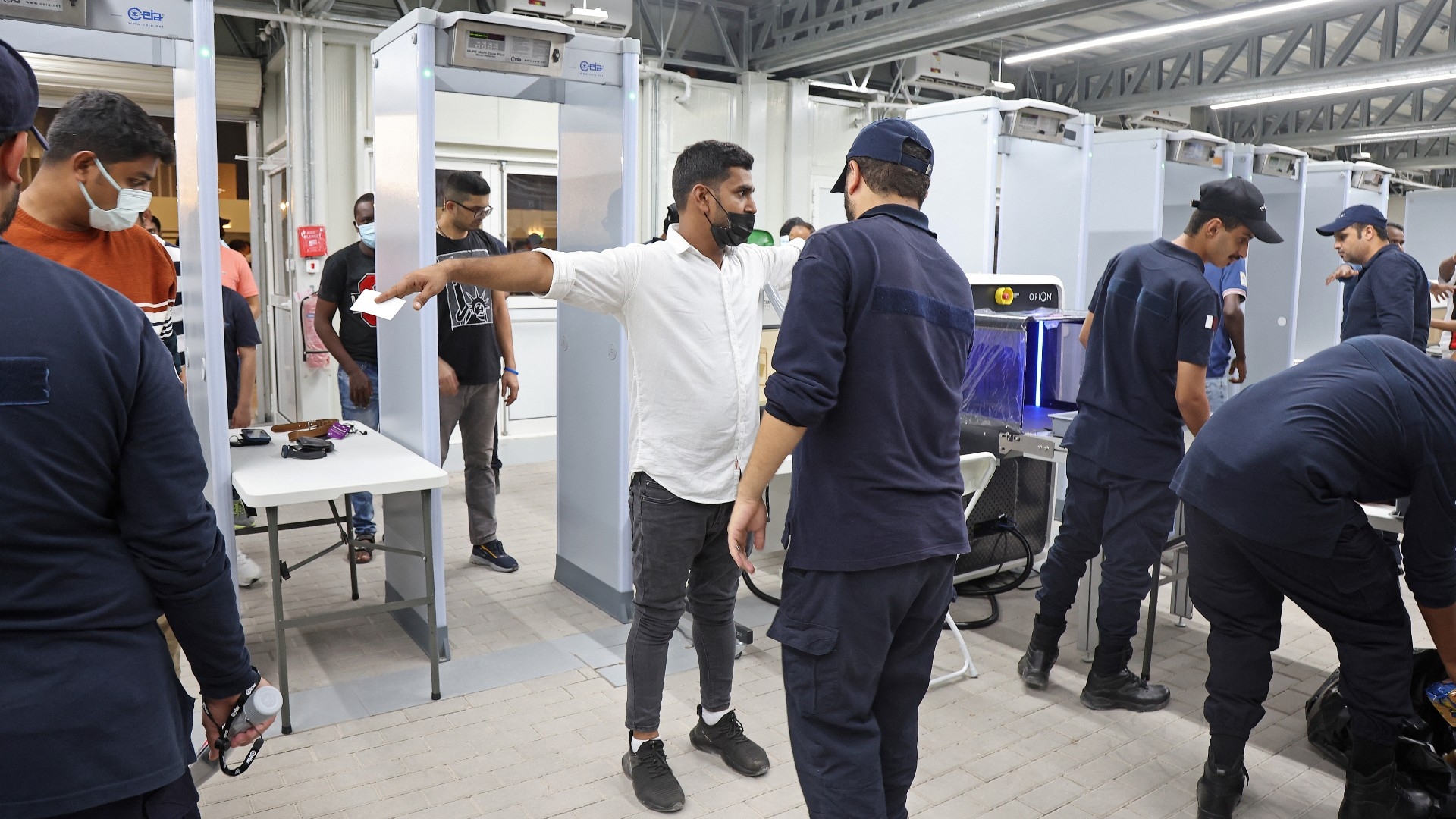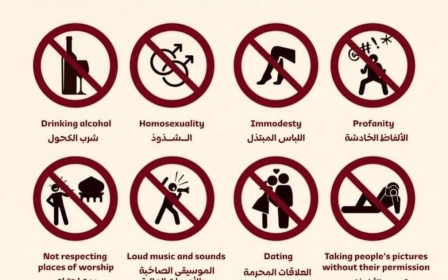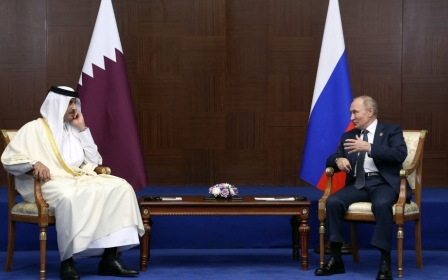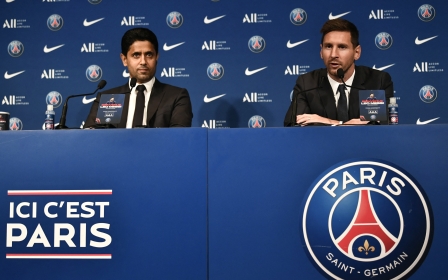World Cup 2022: Qatar strikes global security partnerships to avoid football crises

When Qatari authorities launched the uniforms for security staff at the World Cup earlier this month, observers remarked that the event mimicked the launch of a football kit.
Lines of mannequins, wearing stylish security, riot police and explosive detection attire, were inspected by Khalid bin Khalifa bin Abdulaziz, Qatar’s prime minister, at the grand event in Doha on 2 October.
The pomp and scale was befitting of a state which has signed several partnerships with governments, private security companies and intergovernmental organisations; held training and simulations involving thousands of staff; and hosted a major international security conference, all to be "the safest possible and most secure of all sporting events in the world", according to World Cup security operations chief Khalifa bin Hamad al-Thani.
The security measures put in place include the installation of 15,000 security cameras with facial recognition technology; calling up hundreds of civilians for mandatory military service to manage crowds at stadium checkpoints; and investing $1.1bn to prevent cybersecurity breaches during the event.
The four-yearly tournament, which kicks off on 20 November, comes after months of high-profile flashpoints and disasters at major global football events.
New MEE newsletter: Jerusalem Dispatch
Sign up to get the latest insights and analysis on Israel-Palestine, alongside Turkey Unpacked and other MEE newsletters
In July 2021 around 2,000 people forced their way into Wembley Stadium in London at the Euro 2020 final. In January, eight fans were killed in a crush at an Africa Cup of Nations match in Cameroon. And French police tear-gassed Liverpool fans during the Champions League final in May, which a panel of experts this week blamed on "an abject failure" by European football's governing body, Uefa.
Just three weeks ago, 133 people were killed after Indonesian police used teargas to respond to a pitch invasion in the city of Malang, causing a crush among spectators.
Qatar, the smallest country to host a World Cup and the first from the Middle East, is hoping its collaborative global effort will prevent similar scenes, as attention turns to its shores.
A spokesperson for the 2022 Supreme Committee for Delivery and Legacy told Middle East Eye that "Qatar benefits from one of the lowest crime rates in the world", citing the Numbeo Crime Index, which in January ranked it the safest country in the world.
But will its low crime rate and international collaboration be enough?
French partnership raises eyebrows
Since winning its bid to host the World Cup in 2010, Qatar has signed memoranda of understanding with Turkey, France, the United States, Morocco, Pakistan and the UK, among others, to provide security equipment and personnel and share best practice. It has also partnered with Interpol, the International Centre for Sport Security (ICSS) and Europol.
"The International Police Cooperation Centre (IPCC) will contribute to the safety and security of the tournament, through cooperation between international police agencies," the Supreme Committee spokesperson said.
They added that the coordination and exchange of information would be between global organisations, representatives of international police agencies and "friendly countries".
But a partnership with one of those "friendly countries", France, has caused concern in recent days. On 5 October, the French interior ministry confirmed it was sending more than 200 gendarmes and police officers to Qatar for the World Cup.
France may be using the opportunity to test its capabilities ahead of its own hosting of both the 2023 Rugby World Cup and 2024 Olympic Games - but not everyone is convinced by Qatar's choice of partner.
"Did someone show the Qataris the videos of the last Champions League final?" remarked French football magazine So Foot.
French police were heavily criticised for tear-gassing and pepper-spraying football fans, including children, at the match between Liverpool and Real Madrid in Paris.
Initially, France's Interior Minister Gerald Darmanin blamed British fans for "fraud on an industrial scale".
He has since apologised, along with a Paris police chief, and governing body Uefa, for the handling of the event.
On Monday, an independent panel, which included 480 testimonies from fans and journalists, found there were unprovoked assaults on fans by police and local gangs, inadequate provisions for crowd safety and event management, and insufficient preparation by Uefa and Paris agencies.
The French-Qatari security partnership was further brought into question after several French cities, including Paris, announced they would not broadcast the tournament on large screens, as a protest against Qatari environmental and human rights concerns.
But despite this, Doha still sees an opportunity with its international ally.
"France is an important economic and diplomatic partner of Qatar, in particular with Qatari investment in French sport, illustrated by the case of the takeover of Paris Saint-Germain in 2011," French writer Kevin Veyssiere, who specialises in geopolitics and football, told Middle East Eye.
Veyssiere noted that Qatar has investments and partnerships with several large French companies, including Accor, Lagardere and Veolia. That has strengthened in the run-up to the World Cup, he said, citing the example of the French state-owned RATP Group joint-operating the newly launched Doha Metro.
"This collaboration at the security level is therefore only the logical continuation of the aid provided by France to Qatar," said Veyssiere.
Doha can see the benefit of French expertise on crowd management, he adds, in spite of its recent fallibilities.
Crowd management
Officials in charge of running the World Cup have kept a close eye on events in Paris, London and elsewhere.
"Qatar has… undertaken observation programmes at a number of mega events since winning the bid in 2010 to ensure we are as prepared as we possibly can be from a security perspective," the Supreme Committee spokesperson said.
But analysts believe some of the challenges seen at previous large events may not prove an issue in Qatar.
"Normally at football tournaments, the vast majority of people that attend don't have tickets," Geoff Pearson, a law professor at the University of Manchester, and researcher on policing and football crowds, tells Middle East Eye. "People who may have tickets for just one game will hang around for the whole four weeks to experience the carnival atmosphere. I sense that won't happen in Qatar."
Pearson said that disruptive fans of national teams, who can cause problems for the authorities, are less likely to show up.
"A lot of teams that normally have big followings... are struggling to sell out [their allocated tickets]. So you won't tend to get those pressure points we may have seen at other tournaments."
Where the problems could arise is in Qatari inexperience at hosting such high-pressure events over an extended period.
On 9 September, Saudi team Al-Hilal beat Egypt's Zamalek at the first event held at Lusail Stadium, the World Cup final venue. But while security appeared to run smoothly, fans complained of widespread disorganisation, including water shortages and long walks in 35 degree heat.
"As a test event, [it] was designed to identify any operational issues and learn lessons that may be applied to help Qatar deliver a seamless experience for all at the Fifa World Cup 2022," the Supreme Commitee said at the time.
"Every team involved in the event's organisation gained invaluable experience they will carry into this year's tournament."
Qatar has hosted major tournaments, including the inaugural Fifa Arab Cup last year, and the Club World Cup in 2019 and 2020 - but those were shorter or involved significantly fewer international fans.
"You've got untested crowd management systems and protocols which could be put under pressure by late arrivals as a result of transport systems not stress tested," said Pearson.
"When you have new stadiums that haven't coped with this, and new personnel - and I don't want to big up the risk, because I think stresses will be relatively low - there is always a risk."
He said that those risks would ultimately depend on "the quality of the training and the personnel".
The Supreme Committee spokesperson told MEE they were confident on that front - for the World Cup and beyond: "We have an extensive security training programme, which will not only deliver a safe and successful tournament, but will also develop best practices for the country."
Middle East Eye delivers independent and unrivalled coverage and analysis of the Middle East, North Africa and beyond. To learn more about republishing this content and the associated fees, please fill out this form. More about MEE can be found here.




